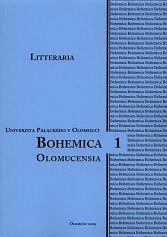PROJEVY LITERÁRNÍHO MANÝRISMU V PŘEDBĚLOHORSKÝCH MORALITÁCH
MANNERISTIC APPROACHES IN MORALIZING TREATISES OF LATE HUMANISM
Author(s): Jana KolářováSubject(s): Literary Texts
Published by: Univerzita Palackého v Olomouci
Summary/Abstract: Renaissance (humanistic) mannerism can be understood as a particular artistic style which emerged in the Czech cultural environment around 1580 and lasted until about 1620. This period of political and religious contradictions, during which man appeared to become more aware of his own existential anxieties, undermined the ideals of Renaissance humanism and changed man’s view of his own place within the cosmos and the possibilities of human reason. This epoch also enriched contemporary literary production with a number of features, for example the liking for burlesque approaches, allegorism, scepticism, grotesque humour and the inclination to esoteric commentary on the world. In terms of genre, moralizing treatises were typical of this period. This paper analyses four such works written before the Battle of White Mountain, that is Theatrum mundi minoris by Nathanaél Vodňanský of Uračov (1605), Theatrum divinum by Matouš Konečný (c. 1616), Třinácte tabulí věku lidského (Thirteen Tables of the Ages of Man) by Bartoloměj Paprocký of Hloholy (1601), and Věk člověka (The Ages of Man) by Tobiáš Mouřenín of Litomyšl (1604). The analysis shows that in all these texts a certain degree of mannerist approach can be traced. They combine elements of the declining Renaissance (the deep interest in man’s inner and outer world) and the early Baroque (the foregrounding of God’s perfection to the prejudice of the appreciation of man’s value). The works are written in a rhetorized, often highly expressive style. Their stylistic syncretism is manifested by means of the frequent use of quotation, allusion and paraphrase (especially biblical and early Christian), and exempla. From the thematic point of view, the texts strongly emphasize last things as the strongest motivation for man to correct his behaviour. On the basis of the analysis the author of the present paper asserts that the texts in question support the idea of the presence of humanistic mannerism in Czech literature.
Journal: Bohemica Olomucensia
- Issue Year: 1/2009
- Issue No: 1
- Page Range: 10-16
- Page Count: 7
- Language: Czech

